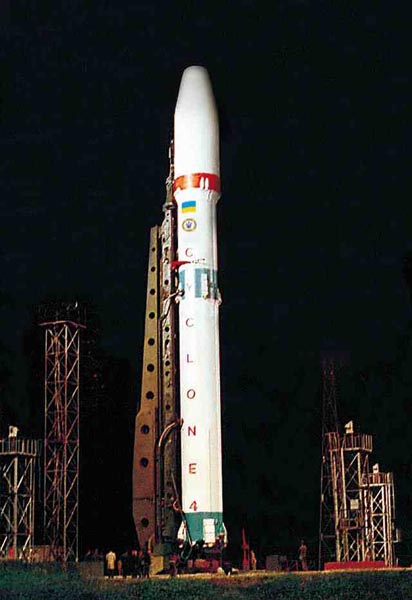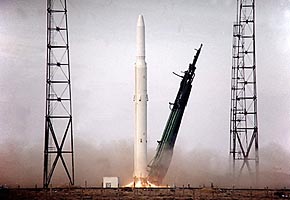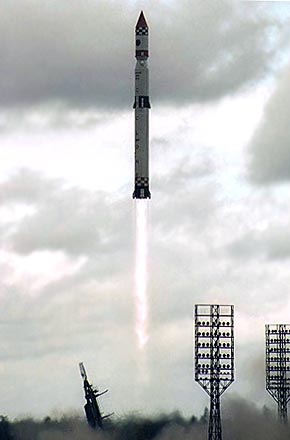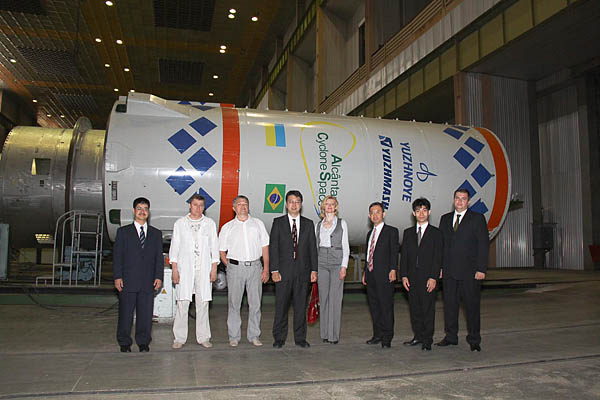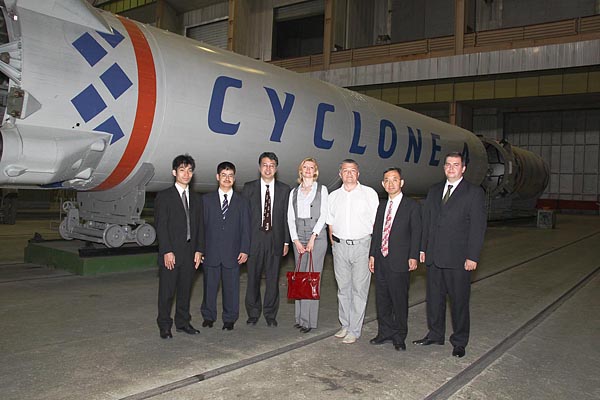Cyclone-4 Launch Vehicle
Courtesy of NSAU
Cyclone-2 Launch Vehicle
Courtesy of NSAU
Cyclone-3 Launch Vehicle
Courtesy of NSAU
Cyclone-4 Launch Vehicle being integrated at SDO Yuzhmoye
(C) 2010-07 SDO Yuzhnoye
Cyclone-4 Launch Vehicle being integrated at SDO Yuzhmoye
(C) 2010-07 SDO Yuzhnoye
|
Cyclone-4 Rocket
is the latest, most powerful version of Cyclone launchers, developed by Yuzhnoye State Design Office and manufactured by Yuzhymash State Enterprise in Ukraine. Cyclone launchers have been developed since 1969 and proven to be one of the highest-reliability launchers.
Cyclone-4 can launch satellites (either single or cluster) with a total mass of up to 5,300 Kg to the equatorial low earth orbit (LEO) or a 1,600 Kg satellite to geostationary transfer orbit (GTO).
Courtesy of NSAU
Cyclone-4: Major modifications from Cyclon-3
Third stage with the three times larger propellant capacity that increases launch capability and decreases longitudinal load to around 6g;
The third stage engine with multiple ignition capability: up to 3-5 times of sustainer engine, and up to 5 times of high-thrust engines. This provides new opportunities such as cluster satellite launch;
Advanced high accuracy control system;
Larger payload fairing with increased payload envelope.
Nano-JASMINE Satellite to be Launched by Cyclone-4
University of Tokyo, National Astronomical Observatory of Japan, Alcantara Cyclone Space and SOO Yuzhnoye have signed an MOU that outlines plans for cooperation on launching Nano-JASMINE Satellite by Cyclone-4 Launch Vehicle from Brazil. They reached basic agreement that Cyclone-4 will launch Nano-JASMINE as one of its piggyback satellites on its maiden flight from Alcantara launch site in Brazil.
For more details:
|
|
|
|
Cyclone-4 Launch Vehicle Major Characteristics
|
|
|
|
|
|
 |
|
|
|
Cyclone-4 Performance to Sun Synchronous Orbit
Courtesy of Yuzhnoye
|
|
|
Lift-off mass (without PL mass), kg
|
|
|
first stage
|
127,400
|
|
|
second stage
|
51,700
|
|
|
third stage
|
13,380
|
Propellants for all stages:
|
|
|
oxidizer
|
Diazote tetraoxide
|
|
|
fuel
|
Non-symmetric dimethyl hydrazine
|
Propellant mass, kg:
|
|
|
first stage
|
121,000
|
|
|
second stage
|
49,000
|
|
|
third stage
|
9120
|
Vacuum engine thrust, tf
|
|
|
first stage
|
297.4
|
|
|
second stage
|
99.5
|
|
|
third stage
|
0.764
|
Dimensions, m
|
|
|
|
length
|
39.95
|
|
|
diameter
|
4 (payload fairing), 3 (others)
|
|
|
|
|
|
|
|
|
|
|
|
|
|
|
|
The Alcantara Cyclone Space Binational Company,
the launch operator, was established by Treaty between Ukraine and Federative Republic of Brazil on Long-term Cooperation in Utilization of the Cyclone-4 at the Alcantara Launch Center. The Cyclone-4 will enter into operation in mid-2010.
Alcantara Cyclone Space
The general director of the ACS for the ucraniana part, Oleksandr Serdyuk, informed that for the first launching, in 2010, that is of qualification, the Cyclone-4 will be taking the scientific satellite Nano, constructed for the Laboratory of Intelligent Space Systems of the University of Tokyo. “This is a reliable test in our service”, commemorates Serdyuk.
http://panoramaespacial.blogspot.com/2008/
05/alcntara-cyclone-space.html
Launch of Nano-JASMINE, Japan Astrometry Satellite Mission for Infrared Exploration
|
